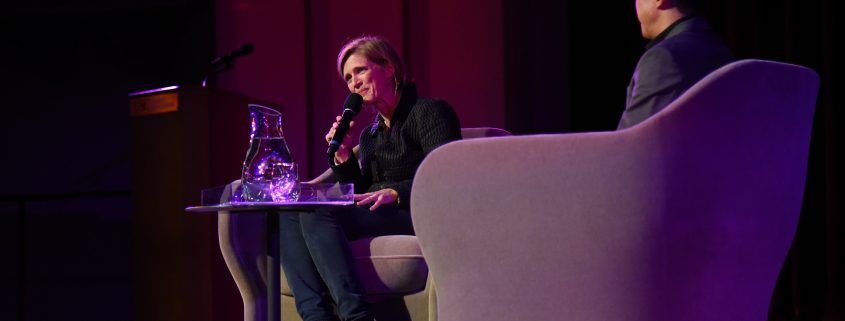Samantha Power discusses new memoir at USC

(William Schmergel | Daily Trojan)
Nearly 250 students, faculty and staff gathered in Bovard Auditorium for a conversation on foreign policy, human rights and the immigrant experience with former United States Ambassador to the United Nations Samantha Power Tuesday night.
The event was co-hosted by 14 organizations, including Undergraduate Student Government and the Center on Public Diplomacy and moderated by CPD director Jay Wang.
Power is currently a professor at the Harvard Kennedy School of International Affairs and previously served in former President Barack Obama’s administration as senior director for Multilateral Affairs and Human Rights. During the event, she discussed her new book “The Education of an Idealist,” her start as an immigrant from Ireland and her career beginnings as a journalist in the former Yugoslavia.
Wang began the conversation by asking Power about the title of her book, of which copies were given to every audience member, and about what it means to be an “idealist.”
“My education … was much more about learning how to advance my ideas; how to build coalitions; how to pick myself up off the floor when I have failed in a very public way and often behind the scenes to convince the president of what I thought needed to be done,” Power said. “So to me, idealism is: Are you happy with what you see right now? Do you feel good about what we are doing about climate change? Not so much? Chances are you have a set of ideas you want to work toward.”
Power said her education started when she immigrated to the United States with her family from Ireland. Though she did not experience as dramatic a transition as immigrants facing a language barrier, she said having that background shaped her outlook on the country and her motivation as an ambassador.
“When you’re an immigrant, you do retain the ability to see America through the eyes of an outsider — I threw myself into sports and threw myself into becoming as American as quickly as I could,” Power said. “I represented the United States on a global stage, but it never really goes away and you’re connected to your family.”
Wang said he relates to Power’s story as an immigrant himself and said the stories in her book are deeply personal and universal.
“As immigrants, we are not interested in the impossible, and to me, America is always about becoming — becoming something better and doing things that you otherwise couldn’t in other parts of the world,” Wang said.
Power also discussed her professional path and how she started off wanting to become a sports journalist. In her novel, Power recounts her experience as an intern at CBS in Atlanta. She said there was a moment when she was taking notes on a game displayed on one monitor, while live broadcasts of the crackdown on Tiananmen Square demonstrators in China were displaying on the other. According to Power, it was at this moment she realized she wanted to learn more about the world.
“All I knew was that I just didn’t feel I knew enough,” Power said. “Here I didn’t know anything about these students, I didn’t know anything much at all about China or Chinese history, so my resolve was very incremental. It wasn’t, ‘I am giving up on wanting to be a sports journalist …,’ it was simply, ‘I am going to go back to college and going to study more and see if I can learn more so that I can put my resolve in some context.’”
At the start of her career, Power went into the Balkans to report on the war and the violent human rights violations in Bosnia. After her time in the Balkans, Wang said Power had many professional paths to pursue, including working for American diplomat Richard Holbrooke. However, Power decided to attend Harvard Law School after deciding to take a step back from reporting.
“I also thought there was something very tangible about the tool of law,” Power said. “I was seeing lawlessness and impunity everywhere. Maybe I would have something more concrete than the power of the pen.”
Power has since devoted her life to studying mass atrocities and working toward ending human rights abuses through her policies of humanitarian intervention. In 2003, she won the Pulitzer Prize for Non-Fiction for her novel “A Problem from Hell,” which follows U.S. action, and inaction, in the face of genocide.
After the discussion, three students asked questions to the former ambassador on topics ranging from America’s Ebola outbreak response to the most hopeful time during Power’s time as ambassador.
Lisa De Rafols, a senior majoring in international relations and economics, said Power’s event taught her about the impact one individual can have on foreign policy, decision making and human rights.
“I learned that the path isn’t always very straight for people who want to achieve those things,” De Rafols said. “There are always lots of difficulties and lots of upheavals that can arise and are unpredictable, but if you are staying true to your values and your ideals, you will be able to impact the people and communities that you want to impact.”
Charlie Convery, a junior majoring in international relations, said bringing Power to campus was a great way to help students engage in intellectual dialogue about lessons learned inside the classroom.
“As an IR major, it is important that when USC offers an opportunity to see the person who makes the policies we hear about in class and to actually go and hear them speak firsthand,” Convery said. “I think she’s left a lasting impact on U.S. foreign policy.”

